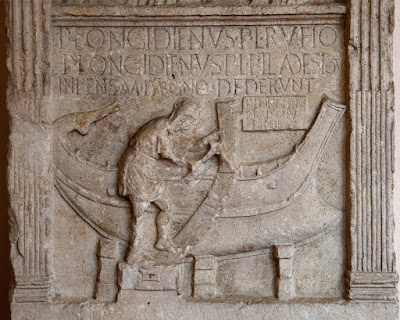Ad celeritātem onerandī subductiōnēsque paulō facit humiliōrēs quam quibus in nostrō marī ūtī cōnsuēvimus, atque id eō magis, quod propter crēbrās commūtātiōnēs aestuum minus magnōs ibi flūctūs fierī cognōverat; ad onera, ad multitūdinem iūmentōrum trānsportandam paulō lātiōrēs quam quibus in reliquīs ūtimur maribus. Hās omnēs āctuāriās imperat fierī, quam ad rem multum humilitās adiuvat.
For speed of loading,
and for drawing them on shore, he makes them a little lower than those which we
have been accustomed to use in our sea; and that so much the more, because he
knew that, on account of the frequent changes of the tide, fewer swells
occurred there; for the purpose of transporting burdens and a great number of
horses, [he makes them] a little broader than those which we use in other seas.
All these he orders to be constructed for lightness, to which object their
lowness contributes greatly.
āctuārius, -a,
-um: swift, agile
aestus, -ūs [4/m]:
tide
cōnsuēscō, -ere,
cōnsuēvī, cōnsuētus [3]: [i] get used to; [ii] (here): be used to
flūctus, -ūs
[4/m]: wave
humilis, -e: low
humilitās,
humilitātis [3/f]: lowliness; (here) lowness
iūmentum, -ī
[2/n]: can refer to any large animal capable of pulling, for example, carts;
horse, mule, donkey, cow
subductiō,
subductiōnis [3/f]: the act of hauling a ship ashore
Ad ¦ celeritātem ¦ onerandī │ for
the purpose of ¦ speed ¦ of loading
[i] ad [ii]
multitūdinem ¦ iūmentōrum ¦ [iii] trānsportandam │ for the
purpose of transporting … a great number of horses [= [i] for
the purpose of ¦ [ii] a large number ¦ of horses ¦ [iii] to be
transported]
Image: a ship builder at work on a relief from Ravenna

No comments:
Post a Comment